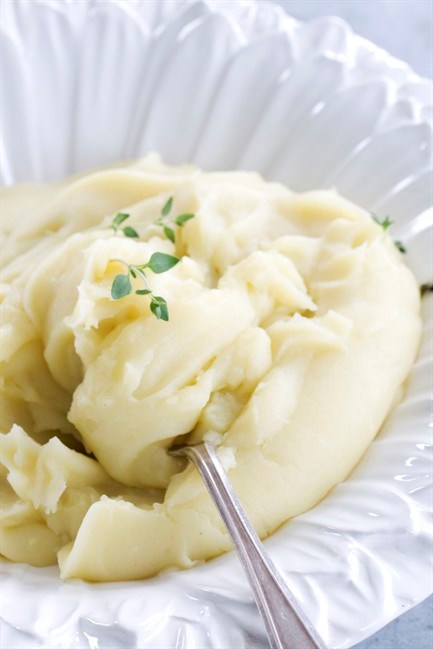When made just right, mashed potatoes are the ultimate comfort food: smooth, creamy, warm and filling — not to mention a perfect vehicle for gravy.
But how to get them perfectly smooth and creamy? Too often ridding mashed potatoes of those pesky lumps forces you to overwork the spuds into a gummy, grainy mess. Or you end up adding so much cream and butter that the dairy drowns out the flavour of the potatoes.
If you like your mashed potatoes fluffy, the answer is fairly straightforward. Choose a floury variety of potato, such as Maris Piper or russet, pass the peeled, boiled potatoes through a ricer, then mix in just enough butter and milk or cream to moisten.
But if you're after a silkier texture — more like what the French call pommes puree — stick with waxy potatoes, such as Yukon gold or fingerlings. You also should try a modernist technique pioneered by food writer Jeffrey Steingarten and refined by the British chef Heston Blumenthal. It adds a step, but it is well worth it.
Steingarten discovered that gently heating the potatoes for a half hour or so in warm water before they are boiled profoundly improves the result. This is because as the potatoes soak in water at about 160 F (70 C), the starch in them gelatinizes, producing a smoother puree on the tongue. The granules that contain the starch also firm up, making it harder to rupture them during mashing.
Recently our research chefs perfected yet another modernist method that yields an amazingly smooth and slightly sweet potato puree, and all without adding any butter, milk or cream. The secret is to deploy a little trick of biochemistry that converts the starch in the potatoes into sugar.
The key to this culinary alchemy is an enzyme known as diastase. Don't let the fancy name put you off; this ingredient is quite natural (it is derived from malted grain), and you can buy it online or at stores that sell brewing and baking ingredients. The enzyme typically is sold in in a ready-to-use form called diastatic malt powder.
Like other enzymes, diastase is a protein whose complex molecular shape allows it to accelerate chemical transformations with amazing speed and specificity. When you eat a starchy food like bread or potatoes, enzymes in your gut help break down the starch into simpler carbohydrates (such as sugars) that your body can burn or store for energy. By adding diastase to our mashed potatoes, we're simply getting a jump on the process.
The trickiest part about using diastatic malt powder is measuring the right amount. It's potent stuff, so you really should measure ingredients by weight. After you have peeled and cubed the potatoes, weigh them. For every 100 grams of potatoes, measure out 1 gram of diastatic malt powder. So 1,100 grams of peeled, cubed potatoes calls for 11 grams of malt powder.
Now fill a pot with water and add 2 grams of sugar and 3 grams of salt for every 100 millilitres of water. Simmer the potato cubes until they are tender, 30 to 40 minutes, then drain. Stir the diastatic malt powder into the potatoes, then pass the mixture through a ricer.
The riced potatoes next get sealed in a zip-close plastic bag, which is set in a pot of hot tap water (about 125 F) for a half hour. The warmth activates the enzyme and starts it gobbling up the potato starch. When the 30 minutes is up, empty the bag into a pot, then heat the puree to at least 167 F (75 C) to halt the enzymatic activity.
That's it. Even with no butter or cream, the result is sweet and amazingly smooth. If you are avoiding dairy or limiting your intake of fats, this technique may just renew your love affair with the potato.
___
MODERNIST POTATO PUREE
As with most modernist recipes, accuracy is key. We've provided volume equivalents of most ingredients, but for best results use a digital scale and weigh things out. Diastatic malt powder is the secret to making these dairy-free pureed potatoes smooth and creamy. It is widely available online, as well as at brewing supply shops.
Start to finish: 2 hours
Makes 4 cups
2 1/2 pounds Yukon gold potatoes
30 grams (2 tablespoons) salt, plus additional for seasoning
20 grams (1 1/3 tablespoons) sugar
10 grams (1 tablespoon) diastatic malt powder
Fill a large pot halfway with hot tap water. Set the pot over very low heat. Maintain the water temperature at 125 F. To hold this temperature, you may need to turn the heat on and off occasionally.
Meanwhile, peel the potatoes and cut them into 1-inch cubes. Measure out 1 kilogram (2.2 pounds or about 7 1/3 cups) of the potato cubes. Reserve any excess for another use. Place the potatoes in a second large pot with 2 litres (about 2 quarts) of water. Add the salt and sugar, then bring to a boil. Reduce the heat to maintain a simmer and cook until the potatoes are very tender, 30 to 40 minutes.
Drain the potatoes, then transfer them to a food processor. Add the malt powder, then process until smooth and sticky. Transfer to a large zip-close plastic bag, pressing out as much air as possible before closing. Place the bag of potatoes in the pot of 125 F water and cook in this manner for 30 minutes.
Empty the potatoes from the bag into a clean pot, then heat gently to at least 167 F. Season with salt and serve immediately.
___
EDITOR'S NOTE: Scott Heimendinger is the director of applied research for The Cooking Lab, the culinary research team led by Nathan Myhrvold that produced the cookbooks "Modernist Cuisine: The Art and Science of Cooking" and "Modernist Cuisine at Home."



